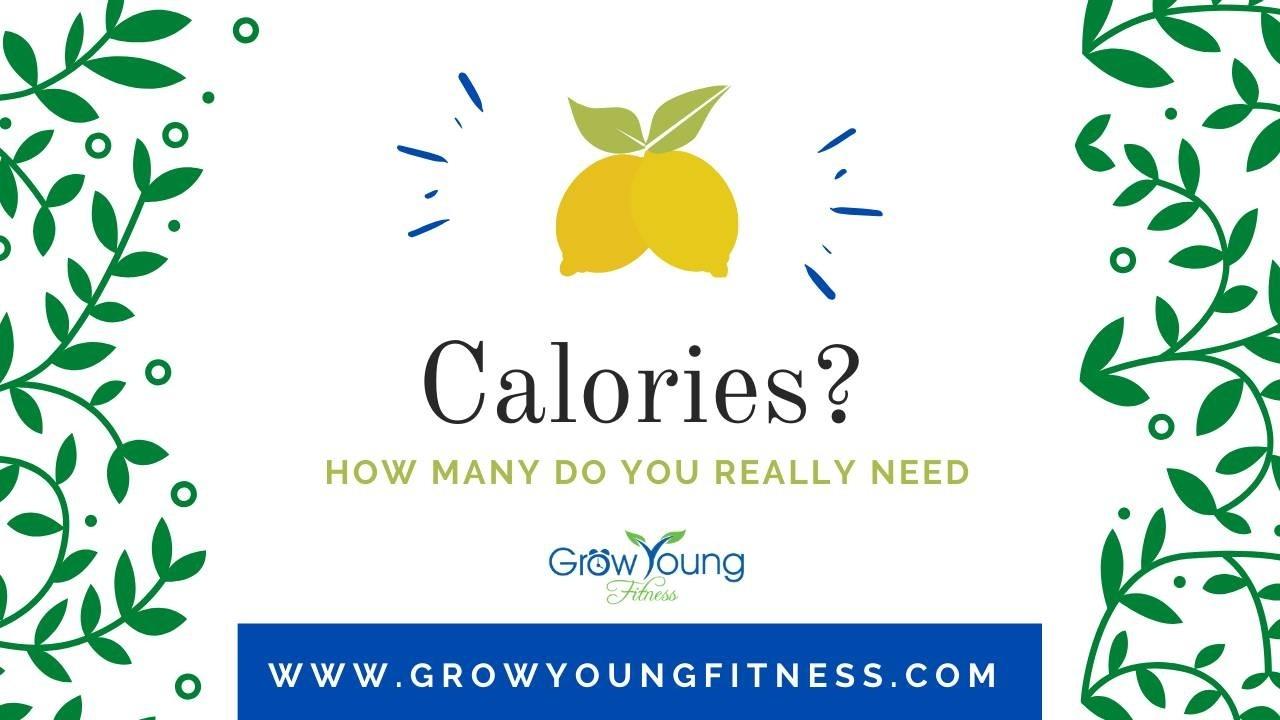Calories... How many do you really need?
Oct 05, 2020
How many calories do you need in a day? Not as many as you may think.
What exactly is a calorie?
A calorie is a unit of energy used to measure:
-
Energy In (calories from food and drink)
-
Energy Out (calories burned through basic bodily functions like breathing, as well as from physical activity).
How many calories do you need?
Your calorie needs depend on your weight, height, age, gender, and activity level.
If you are trying to lose weight, you need to take in fewer calories than what you would burn through your “Energy Out”.
However, exercise doesn’t burn quite as much as we think, and it is not possible to exercise away an overly caloric diet.
While calorie needs vary greatly by person, senior women tend to need 1,600 to 1,800 calories per day, and men typically require between 2,000 and 2,800. Of course, there are many instances in which someone might require more or less.
See where you fit in here: https://www.growyoungfitness.com/calorie
(Most Grow Young Fitness Members will fall in the 1,600-1,800 calorie per day category in order to maintain. If you are trying to lose, then you would need to be consuming fewer than 1,600 calories.)
You don’t necessarily need to count calories, though. Many nutrition experts are proponents of mindful eating. This encourages tuning in and listening to the cues that tell you when you’re hungry and when you’re beginning to feel full. Balance your plate with meals made of mostly whole foods, including plenty of protein, healthy fats, and fiber. By doing this, you will naturally consume fewer calories because you’ll feel full and satiated.
Does the quality of calories matter?
Think about eating 100 calories worth of potato chips versus almonds. While they both contain the same number of calories, the almonds provide protein, healthy fats, fiber, vitamins, minerals, and antioxidants and the potato chips are just carbs and salt. The nutrients that foods contain are so different, therefore your body will treat them as such. You’ll absorb the almonds more slowly, helping to stabilize your blood sugar and keep you fuller for longer. You’ll burn through the potato chips more quickly, perhaps wanting to eat more as a result.
How do calories relate to weight loss and weight gain?
While one pound equates to 3,500 calories, weight loss and weight gain aren’t as simple as calories in and calories out. If you want to lose weight, you’ll need a deficit so you’re burning more than you’re taking in.
The Grow Young Fitness Supplements found on www.growyoungshop.com help you to have a calorie deficit.
Instead of a speedy weight loss, aim for a slower, lasting one, with a goal of losing 1 to 2 pounds per week. You’re likely to lose a little more one week, a little less another. Aim for a deficit of 500 to 1,000 calories daily, which you can accomplish through a combination of reducing calories and increasing exercise.
[ An average Grow Young Fitness workout will help you lose about 5-10 calories per minute of exercise.
30 minutes = 150-300 calories ]
To lose weight without feeling hungry, you’ll want to add fruits and vegetables, since the water and fiber they contain helps you feel satiated. Also enjoy whole grains which provide fiber and protein.
Look first to cutting calories from added sugar, which doesn’t provide a nutritional benefit. Once you’ve reached your goal, it will be important to continue with regular physical activity.
Exercise is always important along with good nutrition in order to maintain that weight loss. If you lose weight then go back to your old habits, you will more than likely put it back on.
That is why lifestyle changes are important with both exercise and nutrition.
Grow Young Fitness is a lifestyle program to help you achieve your goals, and maintain those goals once you get there.
Both the exercises, nutrition information, supplements, and lessons will help you!
The more you use every aspect of Grow Young Fitness, the better your chance of success will be.
Keep it moving!

